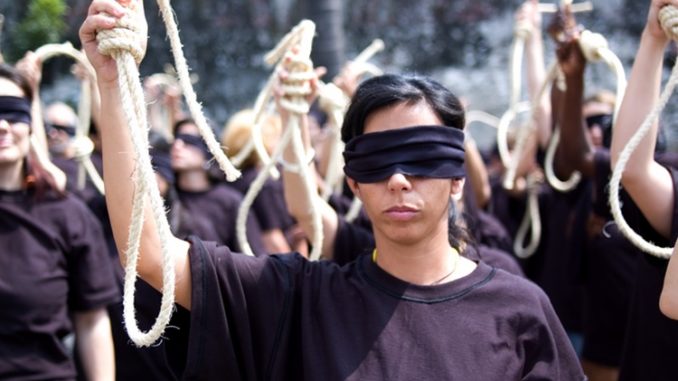Iran’s Dire Human Rights Record In September

Every month, Iran Human Rights Monitor releases a report on the situation of human rights in Iran. The September version reveals an unprecedented crackdown on human rights advocates, several official reports of cruel and inhumane punishments, and at least 33 executions.
The following is a summary of the report, but because of the closed and repressive nature of the Iranian regime, the figures given may be much smaller than the actual figures.
(Download Full Report Here)
Death Sentences Issued by the Mullahs Including Registered Executions in September
Executions: There were at least 33 executions registered in Iran in September, including nine political prisoners who were hanged on the charge on waging war against God and disturbing the state security. Three of those political prisoners were the subjects of international calls by the UN human rights experts and other bodies to halt their executions.
Arbitrary murders: There were seven arbitrary murders recorded, which means that the victim was killed without any sort of legal process. Most of those killed were fathers who were working as porters – carrying goods between countries through mountainous areas – but one was a 17-year-old boy.
Deaths in custody: At least nine prisoners died through torture, being denied access to medical care, or through suicide whilst in prison, showing how harsh the conditions of Iranian prisons are.
Inhuman & Cruel Punishment
Floggings: At least two flogging sentences were carried out in September. A protester arrested during the December 2017 uprising received 70 lashes and one prisoner was flogged in public. Another sentence of 74 lashes each was issued to six activists that took part in a political rally on May 10.
Arrests
In September, there were 197 arrests in Iran, 153 political, 22 based on religion/ethnicity, and 22 arrests for arbitrary reasons. Iran’s security forces have been arresting Ahvazi Arab activists en-masse (even opening fire on young activists attempting to flee), striking truck drivers (who are simply demanding fair pay), other striking workers (who were protesting executions) without any real explanation given for the arrests.
Prison Condition
The prisoners in Iran are subjected to abuse, and mental and physical torture, the denial of medical treatment, the denial of sick-leave or furlough, restricted access to legal counsel, and the harassment of their families. As a result, at least 22 prisoners are currently on hunger strike in prisons across Iran.
One prominent example of the mistreatment of prisoners is the human rights defender Arash Sadeghi. He has cancer, which requires special medical care, but the Iranian government is denying him proper treatment. After he was allowed to have the major surgery he required, he wasn’t even allowed to recuperate for one hour before he was removed and shackled whilst still unconscious and returned to prison, which means medical staff could not conduct their post-op checkups.
Persecution of Religious Minorities
The Iranian government has continued their crackdown on religious minorities, by blocking 57 members of the Baha’i faith from pursuing higher education despite the fact that they had passed the national university entrance examination, some with outstanding results. They were told that they had “deficient records”, an option [excuse] that prevents Baha’i students from accessing their computer records and bars them from higher education. At least 20 Baha’is were also arrested in September.












No comments:
Post a Comment